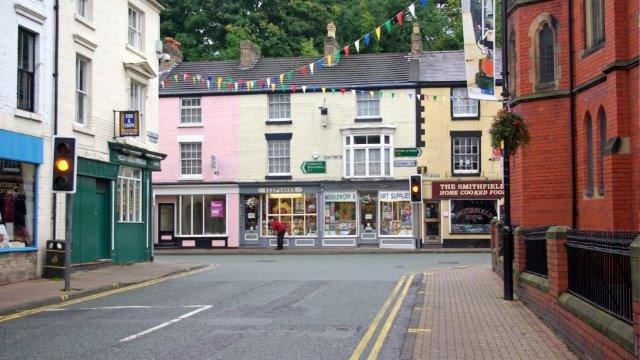General Election 2017: Battle for Ynys Mon
- Published
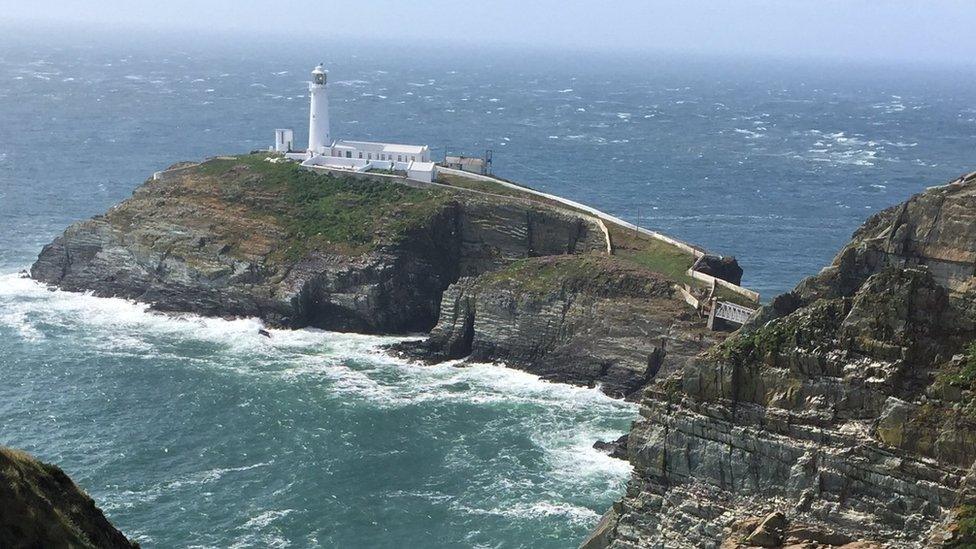
Perched on a cliff-edge overlooking the Irish Sea, hair dancing in the wind, South Stack lighthouse stands on an island ahead of me.
Glorious in the afternoon sun, it is as remote a spot as you will find on Anglesey - itself one of the remotest parts of Wales.
Its isolation and distance from the political hubs in Westminster and Cardiff go some way to explaining how the people of this island tend to plough their own political furrow.
The ebb and flow of political party support on the mainland does not necessarily lap against Anglesey's shores - a candidate's personality can count for far more than the colour of their rosette.
As a result, the Ynys Mon seat, formerly known as Anglesey, has been won by four different parties since the World War Two, and this year's battle is tipped as one to watch.
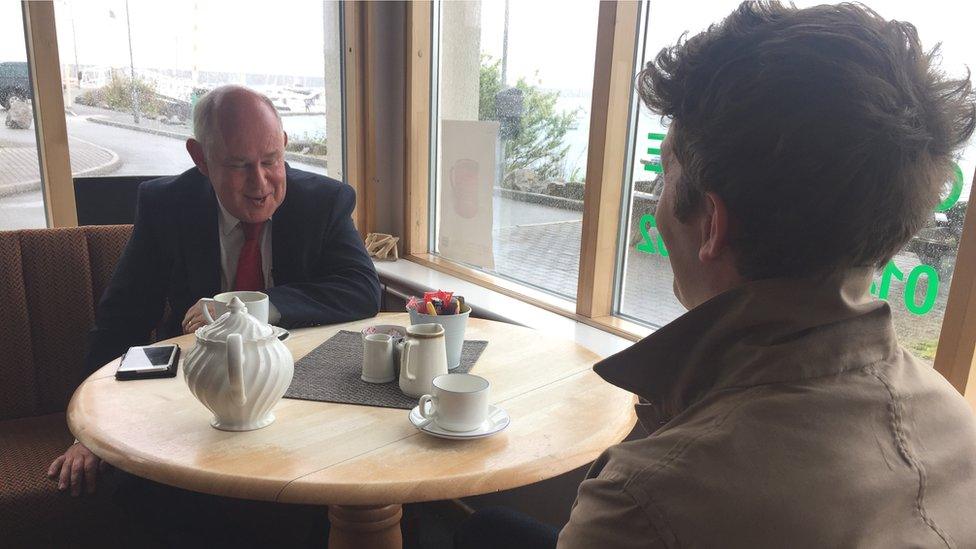
Labour's Albert Owen says he has been written off many times before
On a wet, miserable Monday morning, I meet Albert Owen in a cafe in his home town of Holyhead.
He is the incumbent, having held the seat for Labour since 2001.
Although every sitting MP here who has sought re-election since 1955 has succeeded, the Everton football fan, far from facing an open goal on June 8, is defending a slender majority of 229 votes.
"I'm finding it a lot better than the 2015 election, if I'm absolutely honest with you," he tells me over a cup of tea.
"But I've been written off in 2005, '10, and '15 and now in 2017. I'm not in any way dismissing the fact that there is bad polling but I don't think that people want a Conservative landslide victory."
I ask Mr Owen whether people raise Jeremy Corbyn's leadership of the party on the doorstep.
"Yes, they do. And it's plus and a minus. If you listen to some of the broadcasting, you'd think it's all negative. It's not," he says.
"There are some people who always say we've got the wrong Labour leader - I had it with Blair, I had it with Brown, I had it with Miliband, and I'm getting it with Corbyn."
From our window seat we see a ferry from Dublin arrive to dock in Holyhead port - a reminder of the particular issues facing the island as the UK prepares to negotiate Brexit.
"We are now a gateway to the European Union. Once the United Kingdom leaves the European Union, we will be the gateway to the Republic of Ireland," Mr Owen says.
"I don't think the prime minister quite gets it. She's talking about the hard border between north and south Ireland, but I'm concerned about Welsh ports and no additional tariffs."
Of the five candidates standing for Ynys Mon in this election, only the UKIP contender backed Brexit, whereas Anglesey as a whole went for a leave vote by the smallest of margins - 50.9% for leave, 49.1% for remain.
A 40 minute drive to the opposite end of the island, I meet Albert Owen's predecessor in a chilli shop in Beaumaris.
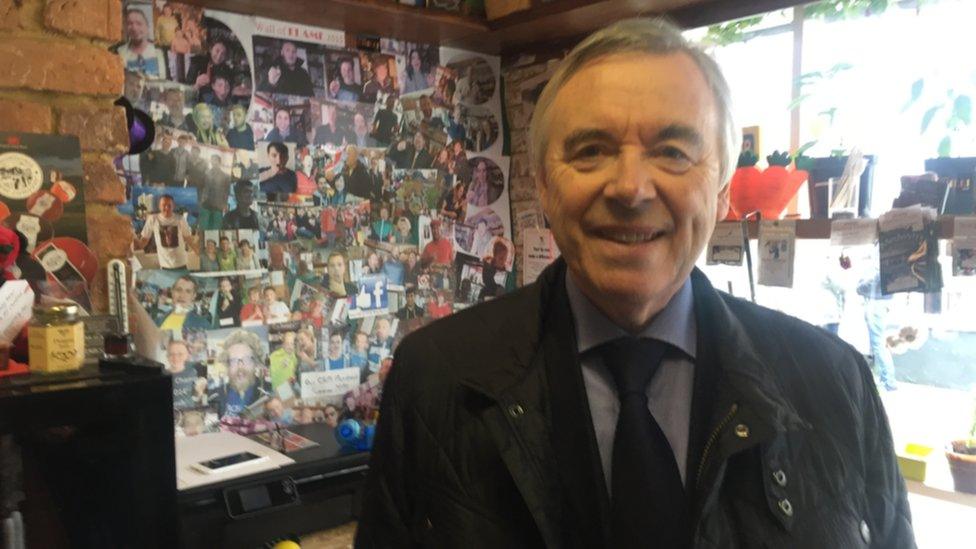
Plaid Cymru's Ieuan Wyn Jones says he has a wealth of experience to offer
After sampling the "bird's eye chilli" - never again - Ieuan Wyn Jones, a former Plaid Cymru MP (1987-2001) and AM (1999-2013) for Ynys Mon before his retirement from frontline politics in 2013, tells me Brexit is the reason for his attempt at a return.
"These are unique circumstances, quite exceptional really in relation to this general election," he says.
"I want to make sure that when we get into Parliament after the 8th of June there is somebody here with a strong local voice to fight on behalf of Anglesey."
Mr Jones's political opponents are trying to frame him as yesterday's man, but the former Plaid leader and Welsh Government deputy first minister says he has the required experience for the job.
"There would be circumstances where, perhaps, a new candidate would be appropriate," he says.
"In these circumstances it's crucial to have somebody with experience of various parts of both the government in the Assembly and, of course, in Westminster itself."
The future of nuclear power on Anglesey - a top Plaid Cymru target - has caused divisions within the party, with leader Leanne Wood having said it is a "difficult issue".
Plans for a new nuclear power station called Wylfa Newydd have been submitted and Ieuan Wyn Jones tells me he has been a supporter "for 10 years or more".
"My position when I go into Parliament is that I want to represent the people of Anglesey and I want to make sure that they have good quality jobs," he says.
The following day, I bump into Mr Jones once again at the Gaerwen cattle mart.
It is clearly a good place to canvass voters, as it is here I have arranged to meet the Conservative hopeful - former Wales Office special adviser and first-time candidate Tomos Dafydd Davies.
Currently living in London and selected with only a month to go until polling day, opponents accuse him of being parachuted in by the party.
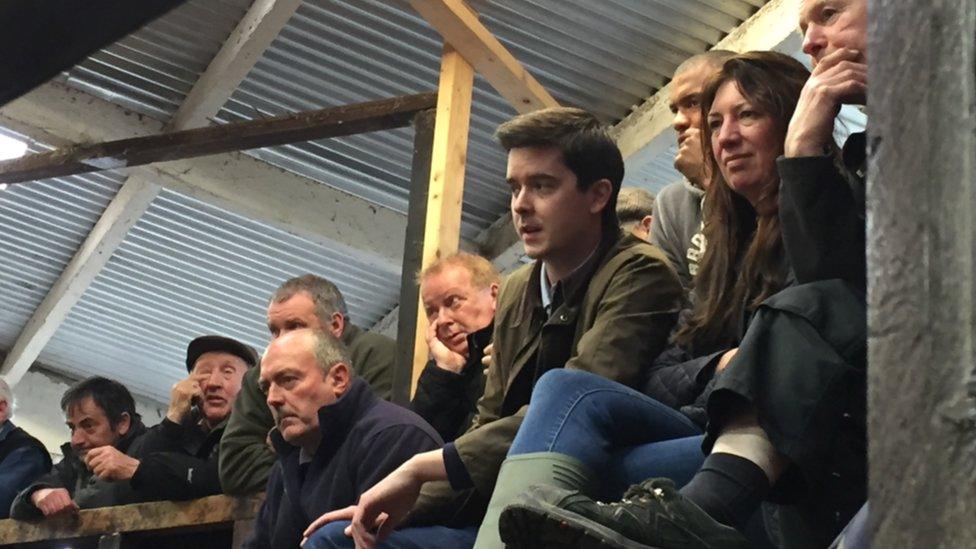
Conservative Tomos Dafydd Davies (centre, dark hair) says his family roots are in farming
"I don't accept that," Mr Davies says. "I'm a proud Welsh-speaking Welshman. The Welsh language is fundamental to my DNA.
"Rural Wales is very close to my heart - both my father's and mother's side are deeply involved with the farming community and, in my professional experience of working in the Wales Office in London, I have delivered for north Wales.
"My message in this election is that it requires a strong Tory voice within a strong Conservative government to get things delivered in this corner of north Wales. We want somebody inside the tent who has the prime minister's ear."
Mr Davies is an "unequivocal" supporter of Wylfa Newydd and recognises the challenges facing the island because of Brexit, "particularly the farming industry".
"I offer something different, something new. I'm a fresh face," he tells me in earshot of three Limousin cows.
"I think voters here are tired of the two main parties, of Labour and Plaid taking the voters of Ynys Mon for granted. I'm offering a fresh, dynamic vision, which I think will be enough to create some history on June the 8th."
A Conservative victory certainly would make history - prior to electing Keith Best in 1979 and 1983, Viscount Bulkeley last won the island for the Tories back in 1722.
Meanwhile, it is 1950 since the Liberal Democrats' Liberal predecessors won here with Megan Lloyd George, daughter of the former prime minister, David Lloyd George.
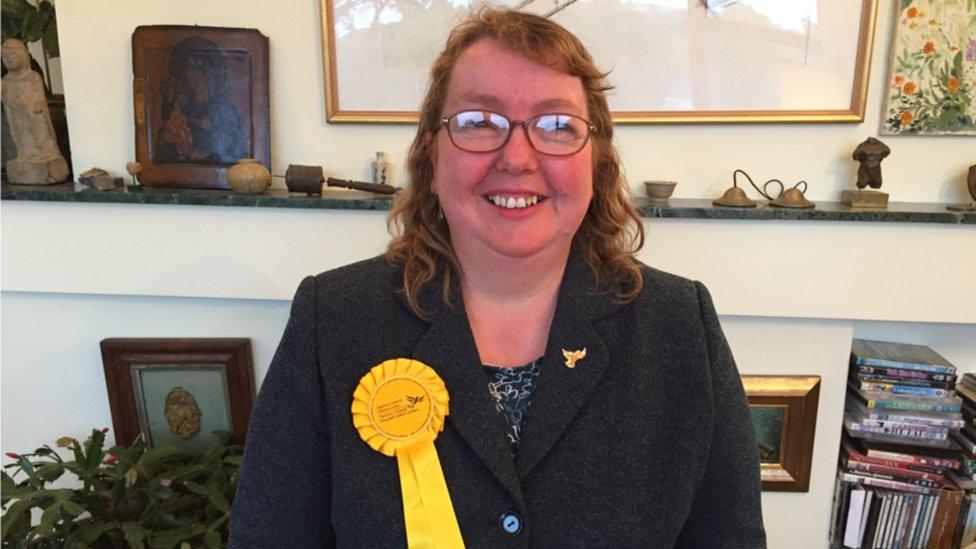
Time to stand up and be counted, says Lib Dem contender Sarah Jackson
Sarah Jackson, born in Liverpool but having lived in north Wales for 14 years, is standing for the party for the first time.
Her opposition to a "hard" Brexit - leaving the EU's single market and customs union - drove her to "stand up and be counted".
The Liberal Democrats, she tells me, are "looking for a much softer option" when it comes to Brexit, while she is "on the fence" when it comes to Wylfa Newydd - "I think there are alternatives we could look at," she says.
Two years ago, UKIP came fourth on Ynys Mon with 5,121 votes.
Despite being offered a range of opportunities, their candidate this time, James Turner, was unable to provide me with an interview.
The island was at one time seen as something of a stronghold for the party but it seems their support is receding.
The big unknown in this election is what will happen to those previous UKIP supporters - will they turn to one of the other parties or stay away completely?
The answer to that question could be pivotal in determining the result on Ynys Mon.
Sorry, your browser cannot display this content.
- Published22 May 2017
